espionage
Conservative MP testifies that foreign agents could effectively elect Canada’s prime minister, premiers
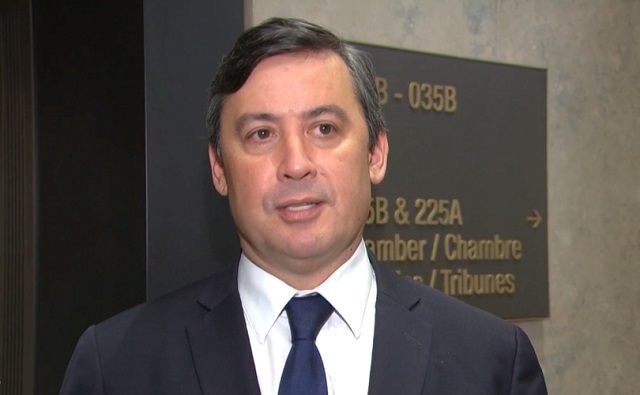
From LifeSiteNews
‘We are effectively opening up the appointment of heads of state or provinces,’ warned Conservative Party of Canada MP Michael Chong during testimony at the Foreign Interference Commission.
Foreign affairs critic for the Conservative Party of Canada MP Michael Chong testified before the inquiry looking into alleged meddling in Canada’s last two federal elections that agents of the Communist Chinese Party (CCP) could install a premier, or prime minister of their choosing by infiltrating supposedly closed party leadership races.
“We are effectively opening up the appointment of heads of state or provinces,” testified Chong to the Foreign Interference Commission, the name of the inquiry tasked with investigating alleged election meddling.
“We could have a situation where a prime minister resigns, and a prime minister is appointed and elected through a leadership process impacted by non-citizens and foreign state actors.”
During his April 3 testimony, Chong suggested that foreign agents working on behalf of China could install leaders of their choosing. He made the testimony after classified documents from Canada’s intelligence services, the Canadian Security Intelligence Service (CSIS), showed that Chinese operatives were allegedly operating through consulate proxies to elect a person of their choosing.
Alleged Chinese proxies working for the United Front Work Department have been under intense scrutiny at the Commission. Indeed, the classified intelligence shows that the federal government of Prime Minister Justin Trudeau knew that there was foreign meddling taking place in the 2019 and 2021 federal elections but did not appear to do anything about it.
As first reported by The Bureau, an intelligence report dated October 2022 claims that CCP agents were active in both provincial and federal party leadership contests during that year.
The assessment did not identify any candidates by their names, but CSIS had been investigating a candidate known only as “CA3” in 2022, during Alberta and British Columbia’s premier leadership races.
The report from 2022 also claimed that a so-called “PRC-linked proxy” was engaged in trying to “help elect the next leader of a federal political party in Canada,” through means of “encouraging individuals who are supportive of the Chinese Communist Party to join this same political party to influence … a more positive view of China.”
According to Liberal Party spokesperson Sarah Fischer, she had earlier told The Bureau that they were “not aware of the allegations.”
The Foreign Interference Commission was convened to “examine and assess the interference by China, Russia, and other foreign states or non-state actors, including any potential impacts, to confirm the integrity of, and any impacts on, the 43rd and 44th general elections (2019 and 2021 elections) at the national and electoral district levels.”
The Commission is being headed by Justice Marie-Josée Hogue, who had earlier said that she and her lawyers will remain “impartial” and will not be influenced by politics and began on January 29.
In January, Hogue said that she would “uncover the truth whatever it may be.”
During testimony last week at the inquiry looking into alleged meddling in Canada’s last two federal elections, the head of the nation’s intelligence agency confirmed that CCP agents did help to elect “pro-China” candidates, also disclosing the existence of a large cash payments scheme totaling $250,000.
Last week as well, David Vigneault, who serves as CSIS director, told the inquiry that he supports the “conclusions” that the CCP was working to help elect China-friendly Canadian MPs.
Thus far, the testimony at the Commission has revealed that former Conservative Party of Canada (CPC) MP Kenny Chiu said he felt “betrayed” by the federal government after only now learning he was the target of agents of the CCP.
Also, the public has learned via the inquiry from Chief Electoral Officer Stéphane Perrault that he was secretly warned by security agents of irregularities in the 2019 election.
Recently, it was revealed that Trudeau’s office knew of security warnings against one of his MPs who was helped to get elected by Chinese agents, yet kept him in the party regardless
When it comes to the CCP, many Canadians, especially pro-freedom Chinese Canadians, are concerned with the nation’s influence in what is supposed to be a democratic process.
As for Prime Minister Justin Trudeau, he has in the past praised China for its “basic dictatorship” and has labeled the authoritarian nation as his favorite country other than his own.
espionage
“Suitcase of Cash” and Secret Meeting Deepen Britain’s Beijing Espionage Crisis
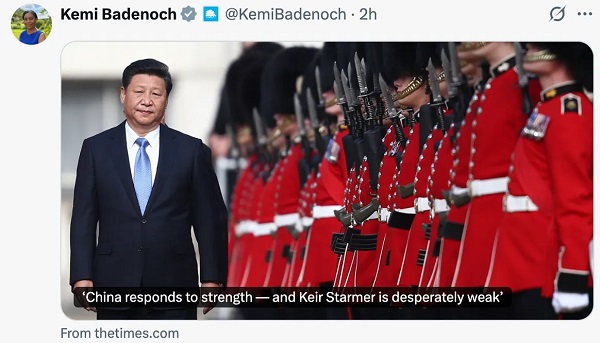
Britain’s most consequential espionage scandal in a generation has narrowed on Keir Starmer’s inner cabinet after The Sunday Times revealed that alleged Chinese agent Christopher Berry was intercepted at Heathrow Airport with a “suitcase full of cash” — and that senior officials, including National Security Adviser Jonathan Powell and Cabinet Secretary Christopher Wormald, held a closed-door meeting, allegedly discussing that advancing the case would harm relations with Beijing, weeks before prosecutors abandoned the insider-threat file.
The revelations, combined with an explosive Opposition letter from Kemi Badenoch and a rare diplomatic intervention from Washington, have plunged Prime Minister Keir Starmer’s government into the most serious national-security controversy of its tenure — one now shaking both Westminster and the Five Eyes intelligence alliance. Not since the Kim Philby affair and the exposure of the Cambridge Spy Ring has a British government been so roiled by allegations of insider compromise and appeasement toward a hostile foreign state.
As The Sunday Times reported, Christopher Berry — a 33-year-old academic from Oxfordshire — was stopped under the Terrorism and Border Security Act after a February 2023 flight from China. Police seized £4,000 in cash, believed to have been supplied by his Chinese handler, codenamed “Alex,” linked to the Ministry of State Security.
A witness statement tabled in Parliament last week indicated that Berry funnelled real-time political intelligence through his MSS handler to one of Beijing’s senior leaders, all collected from a former Chinese teaching colleague — a Parliamentary researcher with deep access to senior Conservative MPs. Beijing reportedly viewed those MPs as a strategic threat, fearing that if they rose to higher office they would adopt a far stricter stance toward China’s geopolitical ambitions.
Though Berry was not detained at the time, the incident became central to the espionage case later dropped by the Crown Prosecution Service when the Starmer government declined to certify that China posed an “ongoing threat to national security” — a legal requirement under the Official Secrets Act.
The Sunday Times also revealed that Deputy National Security Adviser Matthew Collins, the government’s sole witness, privately acknowledged that the decision not to describe China as an “ongoing threat” was “political.” The paper further disclosed that Jonathan Powell — a former banking executive who rose to become Starmer’s National Security Adviser — chaired a meeting on September 1 attended by Cabinet Secretary Christopher Wormald and MI5 Director-General Sir Ken McCallum, in which “the general theme of discussion was how the UK’s relationship with China was going to be damaged by this case.”
If accurate, that account directly contradicts Starmer’s assurance to Parliament that “no minister or special adviser was involved.” The implication — that Britain’s most senior national-security officials were weighing diplomatic consequences while an active espionage prosecution was still underway — has intensified accusations that the case was derailed by political interference rather than evidentiary weakness.
Within hours of the Sunday Times story, Opposition Leader Kemi Badenoch posted a letter to X accusing Keir Starmer of misleading Parliament and concealing ministerial involvement in the case’s collapse.
Framing the letter, Badenoch sought to explain the rapidly evolving affair to a wider audience. “I don’t blame you if you’ve struggled to follow the China spying case engulfing Parliament. Even MPs are finding it hard to keep up with a story that seems to change by the hour,” she wrote. “I suspect many fair-minded people have assumed this story can’t contain much. It seems too implausible for the government to have deliberately let off people who were accused of spying on MPs. But the story is truly astonishing. The layers of it have unravelled over the past few weeks like something from a spy novel.”
In the letter itself, Badenoch demands full disclosure of all correspondence, meetings, and witness-statement revisions involving Jonathan Powell, the Attorney General, or the Cabinet Office. She references the Sunday Times account directly, noting that “Powell left attendees with the understanding that Deputy National Security Adviser Collins’s witness statement would operate within the language of the report,” implying foreknowledge and coordination between Downing Street and prosecutors. She further alleges that Starmer’s ministers “softened” later witness statements to downplay Chinese espionage, replacing hard intelligence assessments with diplomatic phrasing designed to reassure Beijing. Her conclusion is cutting: “You have shown Britain is weak in the face of espionage, and have emboldened our enemies to believe they can spy on us with impunity.”
As reported previously by The Bureau, the controversy has now drawn international concern. The Chair of the U.S. House Select Committee on the Chinese Communist Party, John Moolenaar, has issued an extraordinary public rebuke on the court matter — a move almost without precedent between close allies. In a two-page letter dated October 16, 2025, addressed to James Roscoe, chargé d’affaires at the British Embassy in Washington, Moolenaar warned that Britain’s decision to abandon the prosecution risked setting “a dangerous precedent that foreign adversaries can target democratically elected legislators with impunity.” He wrote that the decision “deeply troubles” U.S. lawmakers and “undermines Five Eyes security coordination,” given the substantial amount of evidence against Berry and Christopher Cash, who were accused of funnelling parliamentary intelligence to the Chinese Communist Party.
“I hope the UK government will not allow this case to falter,” Moolenaar said, “and will instead take the steps necessary to ensure that both justice and due process are served.”
The letter, co-signed by senior members of the Committee and publicly released by Congress, marks an exceptional public intervention in a live national-security case involving a Five Eyes partner. Moolenaar added that the decision to drop the prosecution — despite evidence confirming a direct intelligence channel from Westminster to Beijing — “paints a concerning picture,” noting the resumption of high-level UK–China trade talks, negotiations over China’s proposed “super embassy” in London, and London’s ongoing review of its diplomatic posture toward Beijing. “Allowing this PRC aggression to go unchecked,” he warned, “would only incentivize the CCP to further interfere in Western democracies.”
As The Bureau previously detailed, Matthew Collins’s witness statement traced an intelligence pipeline connecting Westminster directly to Beijing’s leadership. Berry, via his handler “Alex,” transmitted reports obtained from Christopher Cash, a parliamentary aide with access to Conservative MPs critical of Beijing. Collins confirmed that some of the same intelligence later appeared in the possession of a senior CCP Politburo Standing Committee member — reportedly Cai Qi, one of Xi Jinping’s closest allies. Collins also documented Beijing’s targeted inquiries into the 2022 Conservative leadership race, focusing on Tom Tugendhat and Neil O’Brien, both members of the China Research Group (CRG) and long-standing critics of the CCP.
Taken together, the Heathrow cash seizure, the Powell-chaired meeting, the Badenoch letter, and the U.S. congressional intervention point to a modern Cold War crisis — a confrontation that has now moved beyond Westminster to test the cohesion of the Western alliance itself.
The Bureau is a reader-supported publication.
To receive new posts and support my work, consider becoming a free or paid subscriber.
espionage
PEI to Ottawa: Investigate CCP Footprints—Now
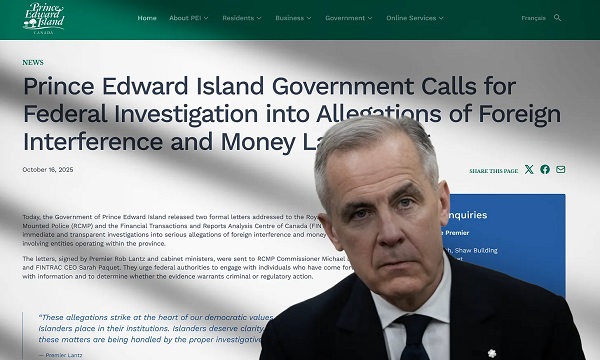
A tiny province just did what the federal government refuses to: demand answers about foreign interference and Chinese money.
Prince Edward Island’s new government just lit a signal fire Ottawa can’t ignore—two formal letters demanding immediate, transparent federal investigations into alleged foreign interference and money laundering on the Island. One to RCMP Commissioner Michael Duheme, the other to FINTRAC CEO Sarah Paquet. Clear, direct, no hedging: talk to the whistleblowers, follow the money, and determine whether criminal or regulatory action is warranted.
And here’s the part that should make every sane person furious: why did it take a new government to do the obvious? Where was this urgency from the last crew running Charlottetown? For years, Islanders were told to calm down, look away, don’t ask questions—and now, in week one of grown-up supervision, we suddenly discover the tools were always there. Why didn’t the previous government pull them?
Even worse, why hasn’t the Liberal establishment in Ottawa barley lifted a finger in regards to foreign interference in this country? This is the same crowd that held a public inquiry into foreign interference, took victory laps, and then… parked the file. The commission issued volumes of findings and 50-plus recommendations, but action? Mostly press releases. Meanwhile, the much-hyped foreign influence registry —passed on paper in 2024— still isn’t fully in force, with cabinet dithering while everyone pretends it’s complicated. If the smallest province can move in days, what’s Ottawa’s excuse after years of warnings and a law they already passed?
Premier Rob Lantz framed it plainly: Islanders deserve clarity and competent, depoliticized scrutiny. The province says the move follows years of speculation and a Parliament Hill press conference on Oct. 8 where a former RCMP superintendent suggested evidence could justify a criminal probe centered on PEI. Translation: this is no longer a fringe concern—it’s now an official paper trail with the RCMP and FINTRAC on the hook.
PEI also reminded Ottawa that in February 2025 it ordered the Island Regulatory and Appeals Commission (IRAC) to run an independent land-ownership investigation—with new powers added to the Lands Protection Act in 2022—amid public questions about complex land purchases and potential indirect control. That review is ongoing and now sits alongside the requested federal probes.
Context matters: investigative reporting in recent weeks connected these concerns to Buddhist-affiliated networks and called for a wider federal inquiry. Whether every allegation holds or not, PEI’s letters escalate the file from media claims to formal federal scrutiny—exactly where it belongs if Canada is serious about foreign interference.
Bottom line: a tiny province—Prince Edward Island of all places—just forced a national reckoning. Not Toronto, not Ottawa, not some vaunted federal intelligence agency. No, it took 160,000 salt-of-the-earth Islanders to do what the entire Liberal Party has refused to do for years: demand an investigation into what looks suspiciously like CCP-linked land grabs, money laundering, and political influence operations happening right under our noses.
And yet—silence from Ottawa. Why? Because could it be that the same people now running the show in this country are the ones who spent the last decade cheerleading for the Chinese Communist Party? Mark Carney, has a track record with China that reads like a LinkedIn endorsement from the People’s Liberation Army. Brookfield, where Carney was Vice Chair, took $250 million from the Bank of China to fund its real estate empire. You think that doesn’t come with strings? Please.
And Trudeau? Let’s not forget, this is the man who once said he admired China’s “basic dictatorship”—because, of course he did. That kind of centralized control makes things so efficient when you’re trying to crush dissent and funnel wealth into the hands of a compliant elite.
The ball is in the RCMP and FINTRAC’s court. But if you’re expecting urgency from institutions shackled to the same political class that let this rot take hold, don’t hold your breath. PEI just did the hard part. Now we get to find out if Canada has any real institutions left.
Subscribe to The Opposition with Dan Knight
-

 Environment2 days ago
Environment2 days agoThe era of Climate Change Alarmism is over
-

 Crime1 day ago
Crime1 day agoPublic Execution of Anti-Cartel Mayor in Michoacán Prompts U.S. Offer to Intervene Against Cartels
-
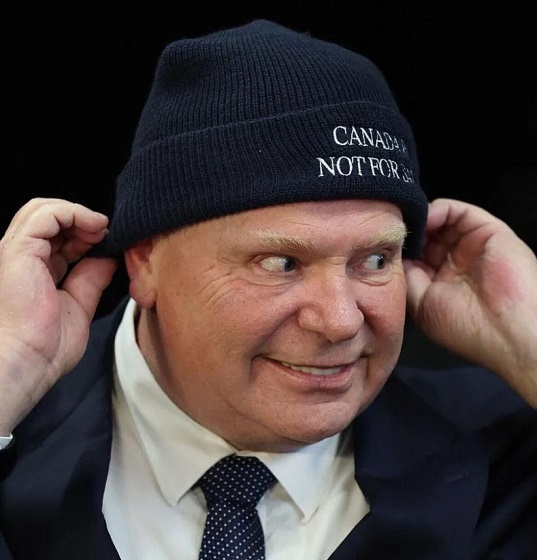
 Business2 days ago
Business2 days agoMystery cloaks Doug Ford’s funding of media through Ontario advertising subsidy
-

 Censorship Industrial Complex2 days ago
Censorship Industrial Complex2 days agoSenate Grills Meta and Google Over Biden Administration’s Role in COVID-Era Content Censorship
-

 Aristotle Foundation1 day ago
Aristotle Foundation1 day agoB.C. government laid groundwork for turning private property into Aboriginal land
-
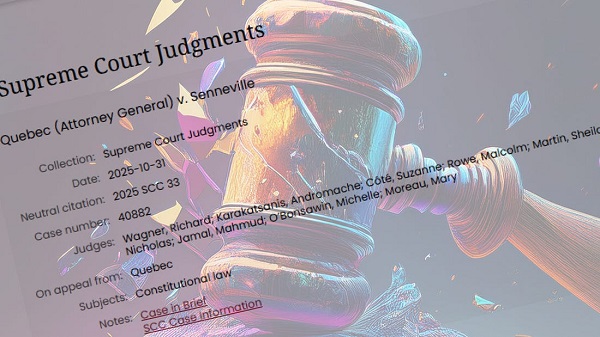
 Justice1 day ago
Justice1 day agoA Justice System That Hates Punishment Can’t Protect the Innocent
-

 Daily Caller22 hours ago
Daily Caller22 hours agoNigeria Would Welcome US Intervention In Massacre Of Christians By Islamic Terror Groups
-

 Business1 day ago
Business1 day agoCarney government should retire misleading ‘G7’ talking point on economic growth










